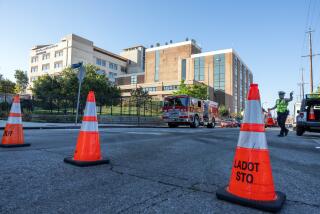King/Drew Fails Final U.S. Test
Federal regulators notified Martin Luther King Jr./Drew Medical Center late Friday that it had failed what was billed as a “make or break” inspection and would lose annual funding of about $200 million — more than half the hospital’s budget — at the end of the year.
The move is likely to force Los Angeles County to close the long-troubled public hospital, give it to someone else to run or turn it into a clinic, as officials have repeatedly acknowledged.
During a lengthy meeting, federal inspectors told King/Drew officials that the hospital still did not meet minimum patient-care standards.
King/Drew has been out of compliance with federal guidelines since January 2004, when it was first cited for serious lapses in care that had injured and killed patients.
During the latest inspection, the hospital failed nine of the government’s 23 conditions for federal funding, according to a letter from the U.S. Centers for Medicare and Medicaid Services that was hand-delivered Friday to King/Drew’s administrator.
Federal regulators identified problems in nursing, pharmacy, infection control, surgical services, rehabilitation services, quality control, patients’ rights and the hospital’s governing body and physical plant.
In fact, inspectors found more problems in the supposedly reformed King/Drew than they had at any time in the last three years. Some of the life-threatening lapses cited were nearly identical to those found in the past.
For instance, the letter said, “there were no appropriately trained and competent staff, on the 3E unit, assigned to watch the heart monitors of seriously ill patients who required cardiorespiratory monitoring. This is especially troublesome, because previously documented cases showed that patients died when nurses at King/Drew failed to heed heart monitor warnings.”
Staff members also admitted to inspectors that they had hit a patient’s morphine pump at least five times to deliver additional sedation, even though the device is intended only to be used by patients. The inspectors called this “a very unsafe practice that can lead to over-sedation, respiratory depression or even death,” the letter says.
“Termination of the Medicare provider agreement is final,” the letter states in underlined text.
It was unclear Friday night whether or how the hospital might continue to operate. The decision means that King/Drew, as currently configured, cannot continue to receive crucial federal funding for Medicare and Medi-Cal patients.
County health officials said their lawyers have called an emergency closed-door meeting of the Board of Supervisors on Monday to discuss the hospital’s future. Supervisors could not be reached for comment late Friday.
In a statement, county health officials said they were still analyzing the agency’s decision.
“The department is committed to finding ways to provide the community access to essential medical services,” said Dr. Bruce Chernof, director of the county Department of Health Services.
The federal government has threatened to pull its funding from King/Drew at least three times before, but it has repeatedly granted reprieves after county officials pledged reforms, including training and disciplinary action for problem employees. In June, the agency said King/Drew would not be given additional chances if it failed a final, top-to-bottom inspection, which was unannounced and took place July 31 to Aug. 10.
The federal action marks a striking failure for the Board of Supervisors, which has spent tens of millions of dollars trying to fix the hospital in the last three years and has been harshly criticized for ignoring King/Drew’s mounting problems.
Jim Lott, executive vice president of the Hospital Assn. of Southern California, said the county’s only choice now is to hand the hospital “lock, stock and barrel” to a private hospital chain and accede to whatever demands that provider makes.
“They have no choice if they want to keep it going,” said Lott, who served as vice chairman of a now-disbanded King/Drew advisory committee. “The county can’t afford to come up with $200 million to $300 million to provide King/Drew the money that’s going to be lost as a result of this.
“I think the community is going to be absolutely unglued — absolutely unglued — over this,” he added.
Federal regulators sent in their own staff this summer to help train King/Drew doctors and nurses in how to pass the final inspection.
Chernof said in June that the hospital was well prepared for the visit. “The staff is really getting to the point where they would welcome the survey,” he said at the time. “They’ve put a lot of energy in this and they’re kind of ready to take the final exam.”
The 252-bed hospital south of Watts is one of the few sources of acute healthcare for the uninsured in South Los Angeles, most of them African American or Latino. King/Drew has enormous symbolic value as well: It was created to remedy racial inequities in healthcare after the 1965 Watts riots and has long been a source of pride — and jobs — in the community.
King/Drew, the second smallest of the county’s four general hospitals, has 2,238 full-time employees and last year treated 11,000 inpatients and 167,000 outpatients.
The hospital has been beset by patient care lapses and other crises almost since it opened in 1972. But the last three years have been its most challenging. The latest crisis began in August 2003 when The Times reported that two women connected to cardiac monitors died after nurses failed to notice their vital signs deteriorating.
Since then, the newspaper and government inspectors have identified case after case in which patients have been harmed or killed because of serious lapses in care. The Medicare agency’s inspectors now have visited the hospital 15 times.
In December 2004, The Times ran a five-part series detailing how King/Drew was much more dangerous than the public knew. The newspaper found that, by a variety of measures, King/Drew was among the worst hospitals in the state, and even the nation.
The hospital’s failings did not stem from a lack of money, as its supporters long contended. King/Drew spent more per patient than any of the three other general hospitals run by Los Angeles County.
Since the series ran, problems continued at the hospital, including additional patient deaths and timecard abuse by county-employed physicians and those under contract at King/Drew. The Times discovered that Navigant Consulting, the firm that has been paid more than $17 million to overhaul King/Drew, had inflated its own expenses.
In February 2005, the hospital lost its seal of approval from the Joint Commission on Accreditation of Healthcare Organizations, another vote of no confidence by medical experts in the hospital’s quality.
The county has scrambled to fix problems at the hospital, taking some form of disciplinary action against 650 employees since January 2004, more than a quarter of its staff. More than 250 employees, 41 of them doctors, have been fired or resigned under investigation, according to a Sept. 15 memo from the county Department of Human Resources.
Former county health director Dr. Thomas Garthwaite said Friday that before he left in January, Catholic Healthcare West had expressed interest in taking over King/Drew. The county also discussed turning the hospital into an outpatient clinic under the licensure of Harbor-UCLA Medical Center.
“I think you’ve got to be able to pass the [Medicare] and the Joint Commission standards to run a hospital,” he said. “Virtually every other hospital in the United States does.”
County officials have said repeatedly over the last 2 1/2 years that King/Drew has turned a corner. Each time, when inspectors returned to assess the hospital’s progress, they found problems.
In September 2004, the agency entered an unusual contract with the county, giving it a year to overhaul King/Drew’s operations under the guidance of a hospital turn-around firm. But that deal expired and federal officials did not renew it.
The county had expected a final top-to-bottom evaluation of its reform efforts by January, but the regulators took far longer than expected. In June, after California’s top health official accused the federal agency of jeopardizing patients’ safety by moving too slowly, the agency said it would conduct a surprise review within 90 days.
At that time, Jeff Flick, the Medicare agency’s regional administrator, said, “If they are out of compliance, basically the funding stops.”
But he said that if the county turned the operation over to an outside provider or sold it, federal funding might be restored.
Lott said that if King/Drew closes, nearby emergency rooms could be overwhelmed and close.
“This will be the linchpin that brings down emergency medical services in that area,” he said. “I have no doubt about it.”
charles.ornstein@latimes.com
tracy.weber@latimes.com
More to Read
Sign up for Essential California
The most important California stories and recommendations in your inbox every morning.
You may occasionally receive promotional content from the Los Angeles Times.










